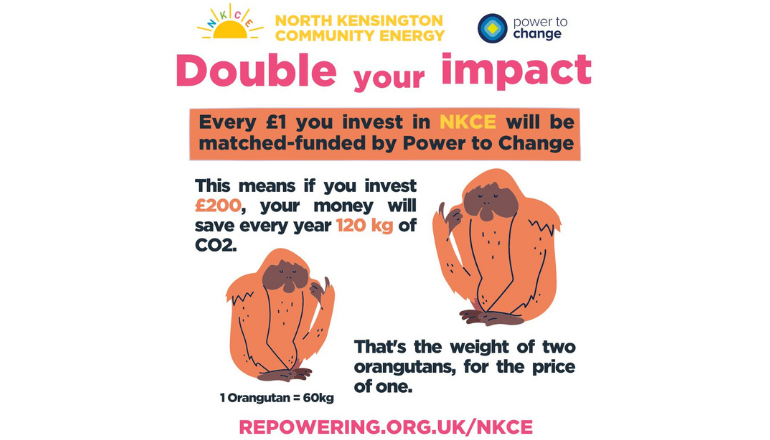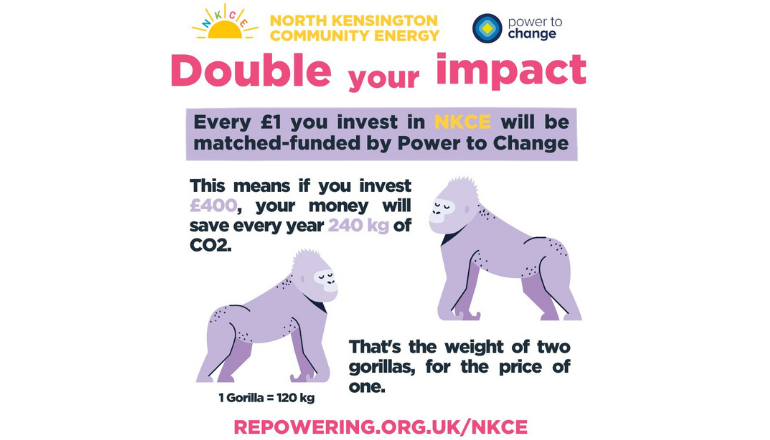A Community Energy Fortnight blog from the Community Shares Unit at Co-operatives UK
The community energy sector is leading the way in raising finance through community shares. We caught up with Éva Goudouneix, the Community Development Manager at Repowering London, who supported a Kensington-based project to raise over £100,000 through their second community share offer.
She’s part of a new generation of community shares advisers who are harnessing their passion and enthusiasm for democratically owned green energy, to invest in a more sustainable future for us all.
Member-led community energy schemes use community shares to remain accountable to their community and raise flexible, patient capital. With two out of three (64%) of community energy organisations registered as co-operative or community benefit societies this remains a popular option To date, there have been at least 250 community share offers in the community energy sector in the UK, this is about 39% of all share offers!
Community share offers are not formally regulated by the Financial Conduct Authority (FCA) but many societies opt to engage with the voluntary regulation scheme, the Community Shares Standard Mark. Co-operatives UK trains and accredits Community Shares Practitioners, like Eva, to be able to award the Standard Mark.
Here is Eva’s story…..
During work experience as a front-line worker in an energy company, it was a shock for me to see the number of people struggling to pay their energy bills.
I think the energy transition should benefit everyone, especially those struggling to make ends meet. The only way to make this happen, in my opinion, is to put energy back in the hands of people and communities.
That’s exactly what Repowering London aims to do – empowering communities by helping them develop their own clean energy co-ops. This is why I’m so driven and motivated by Repowering’s mission - and so happy to be part of their amazing team as a community engagement officer.
I recently started the Community Shares Practitioner Training Programme and worked with North Kensington Community Energy (NKCE) to successfully raise £103,000 through their second community share offer and secure the Community Shares Standard Mark.
Why a community share offer?
The purpose of the share offer was to finance the purchase and installation of 138 kW of solar panels on the Westway Sports Centre in London. The power generated by the solar panels would be sold back to the Westway Sports Centre through a Power Purchase Agreement. This would enable the centre to save money on their bills, tackle climate change at a local level and generate a community benefit fund for local causes.
We actually purchased and installed the solar panels before even launching our community share offer! The costs were covered by a loan from the Esmée Fairbairn Foundation. This allowed us to meet the Feed-In-Tariff deadline, de-risk the investment project for the community, and give us time to plan our fundraising.
Challenges and community engagement
The obvious challenge was to fundraise in the middle of the Covid-19 crisis! Moreover, Kensington and Chelsea suffer from a high degree of income inequality and lack community cohesion. North Kensington has above average poverty rates, child poverty, and people in receipt of out-of-work benefits.
While Repowering’s fundraising campaigns in Lambeth and Hackney attracted around 85% of locally based investors, NKCE’s first share offer attracted only 32% of investors from the borough, with a median investment of £250. It was very important that we increased our percentage of local investors, bringing the diversity of North Kensington into the energy co-op.
Volunteer recruitment
To revive volunteer groups and raise community awareness about NKCE we started to extensively promote our £1-membership offer. We recruited a new director based in North Kensington and expanded our group of local volunteers. Our volunteers organised a Greener Living Day in a local community centre, which was a great success and attracted more than 100 attendees from a diverse audience - enabling us to double subscribers to our mailing list.
The volunteer group grew significantly. While it was not easy to organise online, we made sure to create a warm and energising atmosphere and to give everyone a clear role, which led to a high volunteer retention rate. Most of the volunteers who started in the summer of 2020 are still very active in the group today.
Developing a fundraising strategy
I supported the group to develop a fundraising strategy that was both online and locally focused – two objectives not necessarily easy to align! We lowered our minimum investment amount from £250 to £100 (and £50 for residents under 25 or on benefits). We targeted local residents and communities who didn’t usually engage in community energy projects, reaching out to community organisations beyond those with an environmental focus, such as local churches. We also promoted the share offer through local radio and newspapers, and developed creative online campaigns.
Community energy projects can appear complex and using technical terms or jargon can put people off. We developed clear and simple key messages and used them consistently throughout the whole campaign, identifying three main reasons for people to invest: Tackle climate change, Support local causes, Make money.



Examples of the accessible marketing North Kensington Community Energy used during its share offer
The Community Shares Standard Mark
The Community Shares Standard Mark helped identify shortcomings in the share offer – but it was a challenge to identify the root causes and underlying issues. It made me appreciate the value of having the Standard Mark assessment completed by an external practitioner outside of the training route.
The share offer documentation had two major shortcomings. We had financial forecasts for the Westway Sports Centre project, but not for the society as a whole. NKCE had already completed a share offer and we needed to produce consolidated forecasts. This meant clearly defining the terms and conditions of our share offers and the links between them – would we have one or two classes of shares? What would be our withdrawal policy? It also meant clarifying our future ambitions. How many projects did we intend to start in the coming years, if any?
NKCE was the first Repowering co-op to start a second project – and this was the first Repowering share offer using the Standard Mark framework, so these matters were new to us. Moreover, the volunteer group didn’t have yet a clear vision of the future of the society.
Working through the challenges
I had several in-depth conversations with the Repowering team and with the NKCE group to brainstorm options. We agreed it was best to have one class of shares for all our members. Consequently, I worked on building a financial model where all our members would get the same return on investment and withdrawal terms. I also presented a motion at the AGM to existing members, which was passed unanimously.
Success!
We closed our community share offer after three months and raised £87,000 from the community – despite lockdown restrictions! With the addition of match-funding from the Community Shares Booster programme, we reached our target of £103,000 and could pay back our Esmée Fairbairn Foundation loan.
Our percentage of local investors increased from 32% to 40%, with a median investment of £300. We grew our membership, from 144 to 222 investors.
In hindsight, I think we could have reached a higher percentage by starting our awareness raising campaign earlier and utilising more innovative methods with a wider range of community organisations. Our initial strategy also involved handing out flyers, posters and banners in North Kensington, but we weren’t able to do so because of the lockdown. In future, to become a more diverse and inclusive energy co-op we need to further improve our communications.
Practitioner training
I am very grateful to have worked on this share offer as a trainee practitioner with the support of Co-operatives UK’s Community Shares Unit. It was a steep learning curve for me as I was new to the community shares world. The process of writing the share offer documentation was extremely insightful, not only for myself but also for the NKCE group and for my colleagues at Repowering.
I felt more confident answering difficult questions from potential investors and existing NKCE members. It was also amazing to meet other practitioners and discover how diverse this sector is, and it really increased my interest in the co-operative world.
What would I say to anyone considering the programme? Quite simply, go for it! There’s so much to learn and it’s such an exciting field!
If you’re new to the co-op world like I am, you will really enjoy meeting experienced and knowledgeable practitioners who have a lot to share. And if you’re currently developing or supporting a co-op, the training will be even more helpful and applicable.
Isla McCulloch and Alice Wharton manage the Community Shares Unit at Co-operatives UK. We work with our partners to promote best practice through the Community Shares Standard Mark; train and license Community Shares Practitioners; and grow the market through the Community Shares Booster Programme.
Join us to celebrate Co-op Fortnight from the 21 June - 4 July! The theme for 2021 is #JoinACoop – providing an opportunity to celebrate our members, spread the word about the benefits of membership and encourage people across the UK to #JoinACoop.